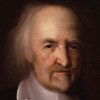“ a man can have no thought, representing any thing, not subject to sense. ”
Thomas Hobbes, Leviathan (1651). copy citation
| Author | Thomas Hobbes |
|---|---|
| Source | Leviathan |
| Topic | senses subject |
| Date | 1651 |
| Language | English |
| Reference | |
| Note | |
| Weblink | http://www.gutenberg.org/files/3207/3207-h/3207-h.htm |
Context
“and his greatnesse, and power are unconceivable;) but that we may honour him. Also because whatsoever (as I said before,) we conceive, has been perceived first by sense, either all at once, or by parts; a man can have no thought, representing any thing, not subject to sense. No man therefore can conceive any thing, but he must conceive it in some place; and indued with some determinate magnitude; and which may be divided into parts; nor that any thing is all in this place, and all in another place at the same time;”
source



